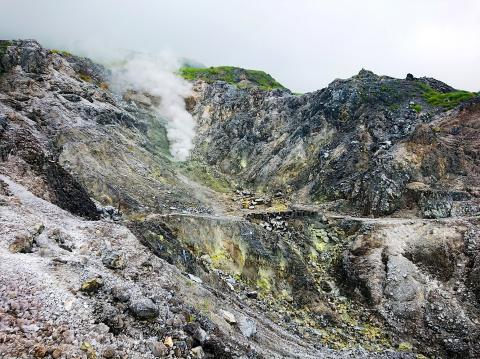Volcanic activity detected beneath Turtle Island (Gueishan Island, 龜山島) and the Datun Volcano Group (大屯山火山群) prove that they are active groups, Taiwan Volcano Observatory Director Lin Cheng-horng (林正洪), who is also an earth science researcher at Academia Sinica, said yesterday.
An active volcano is defined as having a magma reservoir or having erupted in the past 10,000 years, Lin said as he told a news conference about his team’s research over the past decade at the observatory on Datunshan (大屯山) in Taipei’s Yangmingshan National Park.
Almost no geologists in Taiwan thought the volcano group might be active about 15 years ago, as earlier studies had suggested its latest eruption might have occurred about 100,000 years ago, he said.

Photo: Lu Chun-wei, Taipei Times
However, his team has documented the existence of magma chambers beneath Datunshan through the variations in primary waves (P waves) and secondary waves (S waves) of earthquakes since the observatory was set up in 2011, he said.
S-waves cannot penetrate a magma reservoir, which also slows the transmission of P-waves — and both phenomena have been observed in the areas beneath Datunshan and Turtle Island, Lin said.
The island, which is about 10km off the coast of Yilan County, is only populated by military personnel, he said.
Volcanic eruptions under the island were more likely than under Datunshan and might trigger small-scale tsunamis off the coast of Yilan, he said.
However, there is no reason for the public to panic, because volcanic eruptions, unlike earthquakes, can be forecast by monitoring increases in the concentrations of carbon dioxide and sulfate ions, he said.
Lin’s team found that several magnitude 4 earthquakes in Taichung and in Hualien County in 2015 triggered regular “tremors” — or as Lin said, “heartbeats” — beneath Datunshan every 18 minutes for more than a day after each quake.
The team is likely to have been the first to have documented such “regular” quake activities, but its monitoring of such activity was later discontinued.
The team’s findings were published in Scientific Reports, the Journal of Volcanology Geothermal Research and other journals between 2016 and last year.
While there have not been any volcanic eruptions in Taiwan during its recorded history, identifying new evidence about earlier volcanic activities is still exciting, he said.
He expects to improve the volcanic surveys on Turtle Island, where there are fewer monitoring devices, he said.
Volcanologists from around Asia are to meet in Taiwan in October for the 4th field camp of the Asian Consortium of Volcanology, which has previously been held in Japan and Indonesia, he added.
Lin said he was originally interested in earthquakes, but switched to volcanology about 15 years ago after visiting Japanese volcanologists.
The workings of lava and gaseous substances of volcanoes was more attractive than the breaks or fault lines of seismology, he said.

PRAISE: Japanese visitor Takashi Kubota said the Taiwanese temple architecture images showcased in the AI Art Gallery were the most impressive displays he saw Taiwan does not have an official pavilion at the World Expo in Osaka, Japan, because of its diplomatic predicament, but the government-backed Tech World pavilion is drawing interest with its unique recreations of works by Taiwanese artists. The pavilion features an artificial intelligence (AI)-based art gallery showcasing works of famous Taiwanese artists from the Japanese colonial period using innovative technologies. Among its main simulated displays are Eastern gouache paintings by Chen Chin (陳進), Lin Yu-shan (林玉山) and Kuo Hsueh-hu (郭雪湖), who were the three young Taiwanese painters selected for the East Asian Painting exhibition in 1927. Gouache is a water-based

A magnitude 4.1 earthquake struck eastern Taiwan's Hualien County at 2:23pm today, according to the Central Weather Administration (CWA). The epicenter of the temblor was 5.4 kilometers northeast of Hualien County Hall, at a depth of 34.9 km, according to the CWA. The earthquake's intensity, which gauges the actual effect of a temblor, was the highest in Hualien County, where it measured 2 on Taiwan's 7-tier intensity scale. The quake also measured an intensity of 1 in Yilan county, Taichung, Nantou County, Changhua County and Yunlin County, the CWA said. There were no immediate reports of damage or injuries.

OFF-TARGET: More than 30,000 participants were expected to take part in the Games next month, but only 6,550 foreign and 19,400 Taiwanese athletes have registered Taipei city councilors yesterday blasted the organizers of next month’s World Masters Games over sudden timetable and venue changes, which they said have caused thousands of participants to back out of the international sporting event, among other organizational issues. They also cited visa delays and political interference by China as reasons many foreign athletes are requesting refunds for the event, to be held from May 17 to 30. Jointly organized by the Taipei and New Taipei City governments, the games have been rocked by numerous controversies since preparations began in 2020. Taipei City Councilor Lin Yen-feng (林延鳳) said yesterday that new measures by

‘WORSE THAN COMMUNISTS’: President William Lai has cracked down on his political enemies and has attempted to exterminate all opposition forces, the chairman said The legislature would motion for a presidential recall after May 20, Chinese Nationalist Party (KMT) Chairman Eric Chu (朱立倫) said yesterday at a protest themed “against green communists and dictatorship” in Taipei. Taiwan is supposed to be a peaceful homeland where people are united, but President William Lai (賴清德) has been polarizing and tearing apart society since his inauguration, Chu said. Lai must show his commitment to his job, otherwise a referendum could be initiated to recall him, he said. Democracy means the rule of the people, not the rule of the Democratic Progressive Party (DPP), but Lai has failed to fulfill his